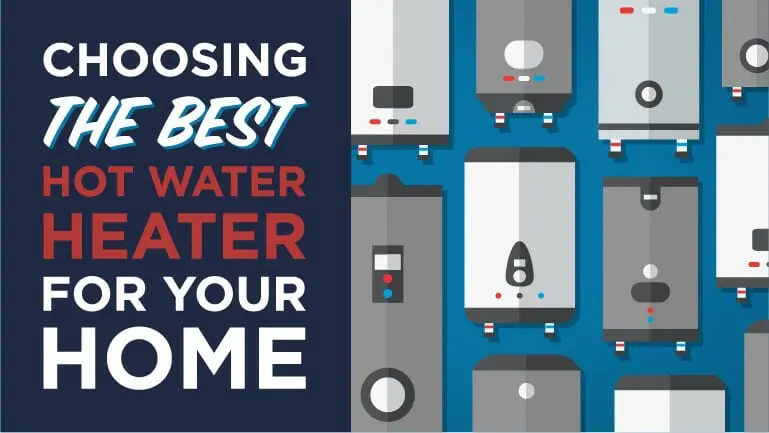
Choosing the Best Hot Water Heater For your Home
Whether replacing an old hot water heater or installing one in a new home, choosing the best hot water heater for your home can be a process. Any homeowner may have a number of questions like:
- Which kind of water heater makes the most sense for the type of energy I have in my home?
- What size unit do I need?
- Should I go tankless?
- What units are the most energy efficient and cost-effective?
Fortunately, we’re here to help answer those questions and make your decision a bit easier. Let’s take a look at your options:
Conventional Water Heater:
A conventional water heater is, as its name implies, the most commonly used system. It stores water that is heated by either natural gas or electricity, and is able to keep that water warm using an insulated tank, until the water is needed.
A conventional water heater is generally a safe choice for most homes. They are relatively energy efficient, very affordable, and last somewhere in the range of 8-12 years. The only drawback of a conventional water heater is for those who use a large amount of water. Unless you install a rather large tank over the standard 40 gallons, your tank may have difficulty supplying a sizable volume of hot water at any given time. A larger tank is always an option, but it also requires more space. However, an HVAC professional can help you approximate your water volume requirements and assess the available space for the correct size. In most cases, though, a conventional water heater is a solid option for most homeowners.
Tankless Water Heater:
We’ve just covered the role of the tank in heating your home’s water, so how is a tankless water heater a thing? How can you heat water that’s not being stored somewhere? In a pretty use of technology, the tankless hot water heater actually substitutes speed for space.
A tankless water heater has superheated coils that flash heat your water when it is triggered. This means a tankless water heater can rapidly heat a large amount of water using a much smaller device than a conventional water heater. However, be conscious of the capabilities of your gas line if you’re considering this option. The more hot water you need, the larger unit you will need to have installed, which requires a larger gas line to function properly.
Going tankless is typically only viable if you use natural gas to heat your home. If you use electricity for heating, a tankless hot water heater would cause your electricity bills to skyrocket to an unsustainable price. Another possible hurdle is the initial investment that is required when purchasing a tankless heater. While in the long run, the efficiency of a tankless water heater will save you money and last 10 to 15 years, the unit and installation are more expensive than other hot water heating options.
Heat Pump/Hybrid Water Heater:
These hot water heaters have a pretty nifty way of heating your water. Hybrids use electricity to collect heat from the air and ground surrounding the unit, and then use that collected heat to make your water hot. It’s sort of the electric-energy alternative to a condensing hot water heater, and is the most energy efficient of all of the heaters we’ve listed here. They do, however, have a number of issues that can become problematic, especially in the chilly winters of Upstate New York.
Because they rely on the heat in the air and ground surrounding them, these units can have issues functioning in cold environments. This rules out storing it in a basement or cellar (a pretty common area to install a unit) unless they are conditioned. So why not just install them somewhere in the home that’s better heated? This brings up the other issue: the hybrid heater requires a lot of space, sometimes up to 8 feet in vertical space alone. Not to mention this type of hot water heater requires the largest initial investment. So while it is not impossible to get one of these units to function efficiently during a cold winter, there are some very specific requirements that your home will need if you don’t want to end up with cold or lukewarm water during the colder months.
No matter which type of water heater you decide on for your home, you’ll still want to have an experienced HVAC company handle your consultation, installation, and future maintenance. That way you can be sure that you’re getting the most out of your investment, in terms of both longevity and efficiency.
